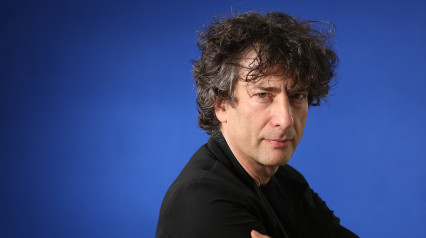Hay Festival, Hay-on-Wye
If the success and reputation of the Hay Festival could be said to be built upon just a few important building blocks then one of them is undoubtedly that ‘classic Hay moment’. It has characteristics – the most important of which is the contrast of the intimacy of the ‘the moment’ with the apparent weight of it. The ‘classic Hay moment’ is when a small roomful of people become privy to something it is clear deserves a wider audience. Those in the room are, quite simply, the privileged few. On Friday Neil Gaiman, a bona fide rock star of the literary world (and make no mistake all you snobs out there, Gaiman is a purveyor of literature), spent at least half of his festival headline slot discussing his close friend and collaborator Terry Pratchett, who died earlier this year after suffering from early onset Alzheimer’s. Gaiman can’t be a man who often finds the need to stand off-centre on any stage – fewer still would presume to take the limelight from him. But as he said of Pratchett himself, when the Discworld creator first suggested they collaborate on the idea that would become The Good Omens, ‘it’s like Michelangelo calling up and asking you to help him paint this ceiling.’ At the time of that conversation Gaiman was about to write Sandman, about to begin his ascent to the rock god heights that are now his home; there is nobody who could have given a better talk about Pratchett than Gaiman; – not simply a friend, not a relative – but a fellow Titan.
And Hay at its best is about so much more than celebrity-gazing. Here you can pick things up, from real pearls of wisdom to meat and gristle advice on the drudgery of the craft. Pratchett, of course, was many things, but his genius was as a storyteller, a talent that is much admired but rarely afforded the awe it deserves. Gaiman calls his old friend ‘a fantasy-writer with the mind of a sci-fi writer.’ Many might think this a geek’s differentiation, but it is more than that: Gaiman was making the point that the best science fiction writers (Clarke, Assimov etc.) were philosophers, ideas-men, prophets. Fantasy writers are lovers of freedom, of childish excess, and of treating kids as peers. Pratchett too was a realist which, admittedly, was unusual for ‘a man who wrote about a disc-shaped world balanced on the back of four elephants, which balanced on the back of a turtle, which swim around for eternity in the oceans of space.’ Match this with Pratchett’s gift for drawing a reader in, for the pace and swagger of his narratives, for the enjoyment he offered those who tried his characters’ company out for at least a few pages, and you have the most rewarding kind of literature.
Gaiman reads a passage from The Good Omens. Working with Pratchett was complicated. He would say to Gaiman, ‘I know what to do with this passage that will make it 17% funnier.’ The worst thing is, was that he was ‘always right.’ The two clearly shared a deep affection for one another, made each other laugh, made each other create, and because of this throughout the hour the conversation keeps on track when it comes to craft. How is it done?
Gaiman, like Pratchett, is impressively prolific. As long as the ideas come, they will be made into literature. He wrote The Ocean at the End of the Lane when a short story he was writing as a gift for his wife just kept going and going until he finished it and found he had to email ‘a bunch of people to apologise for having written a novel nobody is waiting for.’ Later on from the audience, a young girl asks him for advice on how to become a writer, and he paraphrases the moral of this story: write. It is advice most writers have heard a thousand and one times, and some writers have given just as often; but it is the best advice. This young girl, if she had never heard it before, will never hear better. ‘Find your idea,’ says Gaiman, ‘and write out the story. Then leave it in a drawer for a few weeks and come back to it as if you have never read it before. Then work on it. Make it better. Then, when you move on to the next idea, send that first one out to be read. But that bit hardly really matters.’ A little later he is asked, ‘How do you know when a story is finished?’ and, as if to emphasise the nature and robustness of writerly advice quotes Valery’s famous quip: ‘a story is never finished, only abandoned.’ But Gaiman talks like a great storyteller, his voice lilts and pauses, his language moves from poetic sweeps to acuity. His hour entertains, but nobody could have left the auditorium thinking they had not been enriched in some more significant way for having been in Gaiman’s company.
Fantasy literature is in the early stages of an interesting time. It sells big, and the media understands, and pays attention to, money. What the likes of Gaiman (and the dearly departed Pratchett) have is that thing many people eternally grasp for – the microphone! In Gaiman we have not a windbag (the usual hogger of the mic), but a storyteller, a thinker, an ideas-man, with an appetite and a conscience. Pratchett is a great loss, but we still have some gods amongst us.
(Photo credit: Jeremy Sutton-Hibbert)



 Enjoyed this article? Support our writers directly by buying them a coffee and clicking this link.
Enjoyed this article? Support our writers directly by buying them a coffee and clicking this link.








